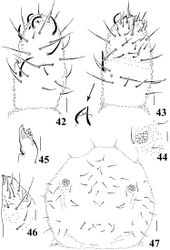Neorganella rotundatae
| Notice: | This page is derived from the original publication listed below, whose author(s) should always be credited. Further contributors may edit and improve the content of this page and, consequently, need to be credited as well (see page history). Any assessment of factual correctness requires a careful review of the original article as well as of subsequent contributions.
If you are uncertain whether your planned contribution is correct or not, we suggest that you use the associated discussion page instead of editing the page directly. This page should be cited as follows (rationale):
Citation formats to copy and paste
BibTeX: @article{Queiroz2013ZooKeys316, RIS/ Endnote: TY - JOUR Wikipedia/ Citizendium: <ref name="Queiroz2013ZooKeys316">{{Citation See also the citation download page at the journal. |
Ordo: Poduromorpha
Familia: Brachystomellidae
Genus: Neorganella
Name
Neorganella rotundatae Queiroz & Mendonça, 2013 sp. n. – Wikispecies link – ZooBank link – Pensoft Profile
Type material
Holotype: male, on slide, Label: Nº 1984 CM/MNRJ, Itatiaia, RJ, Brasil, Queiroz, G.C. leg, 14.iii.2011, 22°22'59"S, 44°40'1"W. Paratypes: 1 female and 4 juveniles on slides, Label: Nº 2133 CM/MNRJ (C and D), Itatiaia, RJ, Brasil, Queiroz, G.C. leg, 13.vii.2011, 22°22'59"S, 44°40'1"W. Deposited at MNRJ, Rio de Janeiro, Brazil. Two specimens deposited at MNHN, Paris, France: 1 female on slide, MNHN-EA011502, Itatiaia, RJ, Brasil, Queiroz, G.C. leg, 13.vii.2011, 22°22'59"S, 44°40'1"W1 juvenile on slide, MNHN-EA011503, Itatiaia, RJ, Brasil, Queiroz, G.C. leg, 25.x.2011, 22°22'59"S, 44°40'1"W.
Type locality
Brasil, Rio de Janeiro: Itatiaia municipality, Parque Nacional de Itatiaia (ICMBio), 22°22'59"S, 44°40'1"W, leaf litter and soil of “campos de altitude”, 2,400 m a.s.l.
Description
Habitus typical of the family. Body length of holotype: 0.88 mm; body length range of paratypes: 0.47–1.20 mm. Color in ethanol: white, no pigmentation.
Ratio head diagonal: antenna = 1:0.63. Ant I with 7–8 chaetae. Ant II with 12 chaetae. Ant III and IV fused dorsally, ventral separation marked. Sensory organ of Ant III with two small club-shaped sensilla, the mid-ventral one with a bilobed apex; two longer and subcylindrical guard sensilla; ventral microsensillum present (Figs 42–43). Ant IV with simple apical bulb and five sensilla; dorsolateral microsensillum present; subapical organite round; about 30 ventral chaetae (Figs 42–43). Without eyes. PAO bearing 10–12 vesicles disposed as an elongated rosette (Fig. 44). Maxilla quadrangular with 6–7 teeth (Fig. 45). Labral formula: 2/2334. Labium typical of Brachystomella, with one papillated chaetae (L) and four proximal chaetae (Fig. 46).
Head chaetotaxy as in Fig. 47. Chaetae a0 absent; Oc chaetae 3+3. Dorsal chaetotaxy composed of slightly serrated chaetae and longer sensilla (Fig. 48); Abd V with some longer chaetae, subequal to sensilla, and Abd VI with 4+4 serrated chaetae with a tendency to have bent tips (Fig. 49). Th I with 2+2 chaetae; sensillar formula by half tergum: 022/211110. All dorsal and lateral chaetae are slightly serrated. Chaetotaxy of legs I–III as follows: Scx I – 1, 2, 2; Scx II – 0, 2, 2; Cx – 3, 6, 7; Tr – 5, 5, 5; Fe – 12, 12?, 10; Tita – 18, 18, 17. Tenent hair on tibiotarsi acuminated; unguis of legs I and II with one extremely minute median inner tooth; tooth not seen on unguis of leg III (Fig. 50). Ventral tube with 3+3 chaetae. Tenaculum small with 2 teeth on each ramus. Furca reduced to two small globular dens with 3–4 chaetae on each side and without mucro (Fig. 51). Abd VI with 4+4 serrated chaetae with bent tips, of which 2+2 are longer than others (25μm to 20μm), and one unpaired smooth chaetae on dorsal side (Fig. 52). Each anal valve with 12 chaetae and 2 hr chaetae; Abd VI with 3+3 smooth chaetae on ventral side (Fig. 53). Female and male genital plate as in Figs 54 and 55, respectively.
Etymology
The Latin word rotundatae means roundish, spherical, referring to dens shape of the new species.
Discussion
The new species Neorganella rotundatae sp. n. is well characterized in the genus, mainly due to the facts that it shares a reduced furca without mucro, dens with 3+3 chaetae, and the presence of tenaculum with the other species Neorganella nothofagutalis Rapoport & Rubio, 1963 (according to original description and after Najt et al. 2005[1]). The new species differs from its congener by the presence of 10–12 vesicles on PAO, while Neorganella nothofagutalis has only 4 vesicles. It is also noteworthy that Neorganella rotundatae sp. n. presents a reduction in the number of chaetae on Tita of legs I–III, being 18, 18, 17, respectively, while Neorganella nothofagutalis has 19, 19, 18 (see Najt et al. 2005[1]).
Original Description
- Queiroz, G; Mendonça, M; 2013: New species of Brachystomellidae and characterization of Micronella porcus (Denis, 1933) from Brazil ZooKeys, 316: 81-98. doi
Other References
- ↑ 1.0 1.1 Najt J, Weiner W, Grandcolas P (2005) Phylogeny of the Brachystomellidae (Collembola) – were the mandibles ancestrally absent and did they re-appear in this family? Zoologica Scripta 34 (3): 305–312. doi: 10.1111/j.1463-6409.2005.00184.x
Images
|

